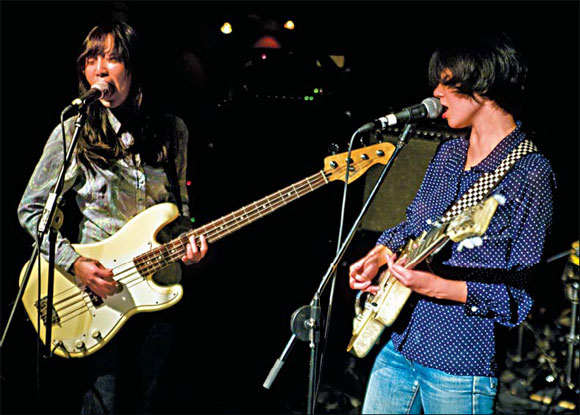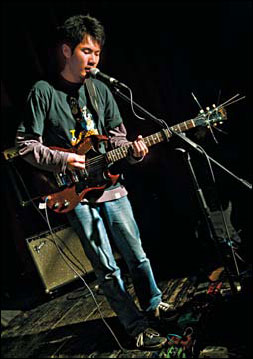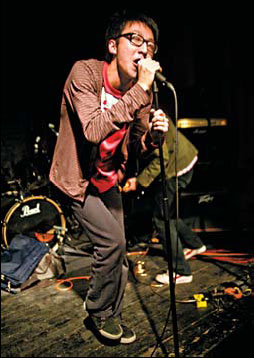Beat of a different drum
|
All female group Ourselves Beside Me. |
The first three CDs released by new local label MaybeMars Records are selling for 30 yuan ($4.10) each, but the label's founder, Michael Pettis, believes that in 30 or 40 years they might sell for $50,000 each on eBay.
Released in November 2007, these three albums are by Carsick Cars, Snapline and Joyside, three largely unknown Beijing-based rock bands.
"When I heard their music, I knew immediately that they are very good musicians, and I believe their albums will be historically important," Pettis says.
Pettis, an American associate professor of finance at the Guanghua School of Management, Peking University, is also the founder of D-22, one of the most popular rock clubs in Beijing and a hub for budding local bands. Back in the 1980s, he ran a club called Sin in New York City's East Village, where some of today's big name musicians like Sonic Youth and John Zorn used to perform when they were starting out.
"Some of the song writers and guitarists in Beijing are among the best in the world, and the city will probably become a major music center like New York or London if Chinese musicians can develop a bigger audience," Pettis says.
|
Carsick Cars' lead singer Zhang Shouwang. |
Even though Beijing is China's capital of rock music, it has barely established a substantial audience and commercial system to support its rock scene. Only three or four local labels are producing rock albums, and there has been only one stadium-sized rock show in the last two years - the retrospective concert of Cui Jian at the Workers' Indoor Stadium on January 5.
However, more new bands are now appearing. At Beijing's rock clubs like Mao Live House and 2 Kolegas, young musicians are performing almost every night.
At a typical gig at D-22, three or four bands perform to an audience of about 100, usually half Chinese and half foreigners.
"Chinese rock musicians like Cui Jian do not have much influence on me. I grew up listening to Western bands such as Sonic Youth and Velvet Underground," says 22-year-old Zhang Shouwang, lead singer/guitarist of Carsick Cars. "At first, saw-gash CDs from the West were the main source for me, and now it's the Internet."
When Zhang and two of his schoolmates at the Beijing Institute of Technology formed their band in 2005, they named it Carsick Cars, which Zhang says is just a play of words. About half of their songs are in English.
"When all the songs you listen to are in English, it's natural that you write and sing in English as well," Zhang says.
For many other groups in Beijing like Ourselves Beside Me, Joyside and Subs, English is the only language they use.
"Language is not important, as long as I can express myself. I pick English because it feels smooth," says Li Yangfan, lead singer/guitarist of the all-female band Ourselves Beside Me.
Though some bands like Carsick Cars, Snapline, and Queen Sea Big Shark are involved in a movement called "No Beijing", it is hard to define the style of these bands, except that they can all be classified in the loose genre of "post-punk".
"In the West we usually have bands of clear styles, but Chinese rock musicians often combine various elements from different styles, as they are suddenly exposed to the whole history of Western rock music," says Adam Gaier, an American bass player who lives in Beijing.
One thing they have in common is that they are more Westernized than senior Chinese rock musicians like Cui or Tang Dynasty, who usually try to inject some Chinese characteristics into their music styles.
"No one cares whether his or her music sounds Chinese now," Zhang says. "That is the work of the last generation. We just play the music we like."
|
Snapline's lead singer Chen Xi. Photos by Matthew Niederhauser |
Carsick Cars are known for their noisy guitars, with alternative tunings, and basic drum beats. Before they released their first album, they had already attracted some international attention.
In 2006, Zhang was invited to New York City to participate in the recording of avant-garde composer Glenn Branca's Symphony No 13 for 100 Guitars. In 2007, Carsick Cars twice toured Europe, first in August with New York alternative giants Sonic Youth in the Czech Republic, Austria and the UK, and then in October by themselves in Austria. In May, they will perform at the All Tomorrow's Parties Festival in the UK.
Snapline also gained international exposure because their album, produced and mixed by English musician Martin Atkins, is distributed in the United States under Atkins' Chicago label Invisible Records. They are also planning to tour in the US.
"We are lucky to be living at this time. We have more opportunities than in the past," says Li Qing, drummer of Carsick Cars and guitarist for Snapline.
Though Carsick Cars and Snapline have sold only 1,000 copies of their albums each, many have heard their music online.
The two bands have just returned from a tour to Guangzhou, Shenzhen and Hong Kong. Though it was the first time for them performing in these cities, they found audiences to be very receptive.
"Through the Internet, people in cities where we have never been to can know about us," Zhang says.
Sonic Youth listened to Carsick Cars' songs on My Space before selecting the band to open their concerts in Europe. Now videos of Carsick Cars can be found on YouTube, and their own website at www.carsickcars.com.
Many of their songs can also be downloaded for free on the Internet.
"Those who like our music will buy our CD, and those who don't buy the CD, we can't stop them from listening to the songs," Zhang says. "We don't have any market anyway."
As opposed to many senior Chinese rock musicians, most of the musicians born in the 1980s have received a college education. Zhang and Carsick Cars' bassist Li Weisi are still students of the Beijing Institute of Technology. Chen Xi, the lead singer of Snapline, has just finished a master's degree from Tsinghua University and now works for Microsoft.
Compared to the more idealistic elderly Chinese rockers, the younger generation of rock musicians often has more practical views toward music and life.
"I think I will find a job after I graduate, as it is almost impossible to make a living by playing rock music in China," Zhang says. "But music will always be an important part of my life."
Li Weisi agrees with Zhang. "If I give up everything else to play rock music, my life will suffer."
When asked if he has any plan for 10 years from now, Zhang says: "No one of my generation is sure what he or she will be doing 10 years later."
Having taught in China for six years, Pettis finds that his students are listening to more diverse music than pop and classical. He says that he hopes D-22 and MaybeMars Records will play an active role in the development of the Chinese rock music scene.
"Today's Beijing is like San Francisco in the 1960s, when only insiders knew how good the scene was. In a few years the whole world will know," he says. "Maybe in five or six years many people in New York or London will have their favorite Chinese bands."
(China Daily 01/15/2008 page18)

















